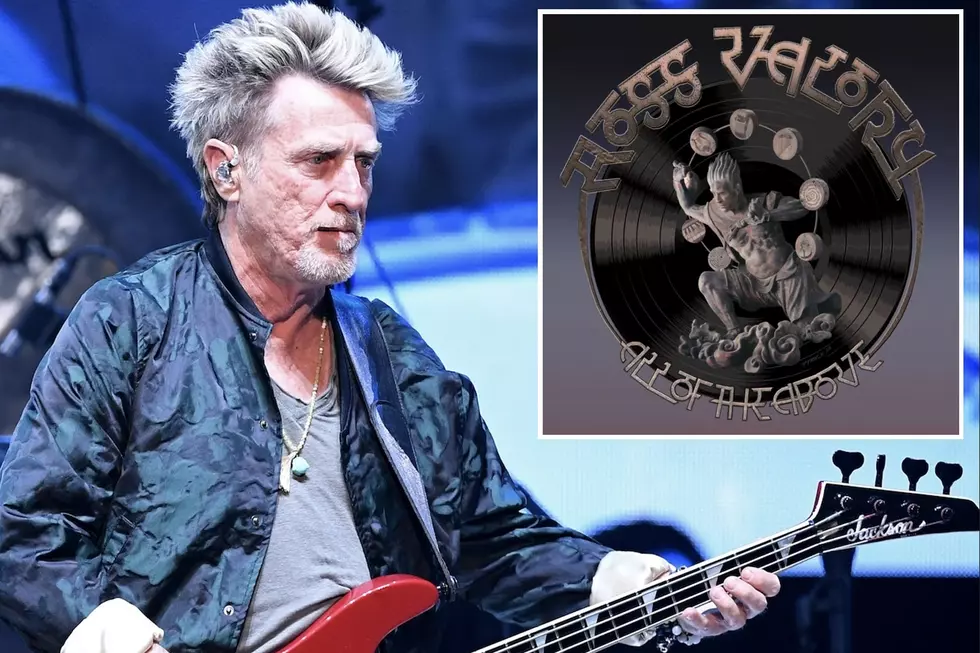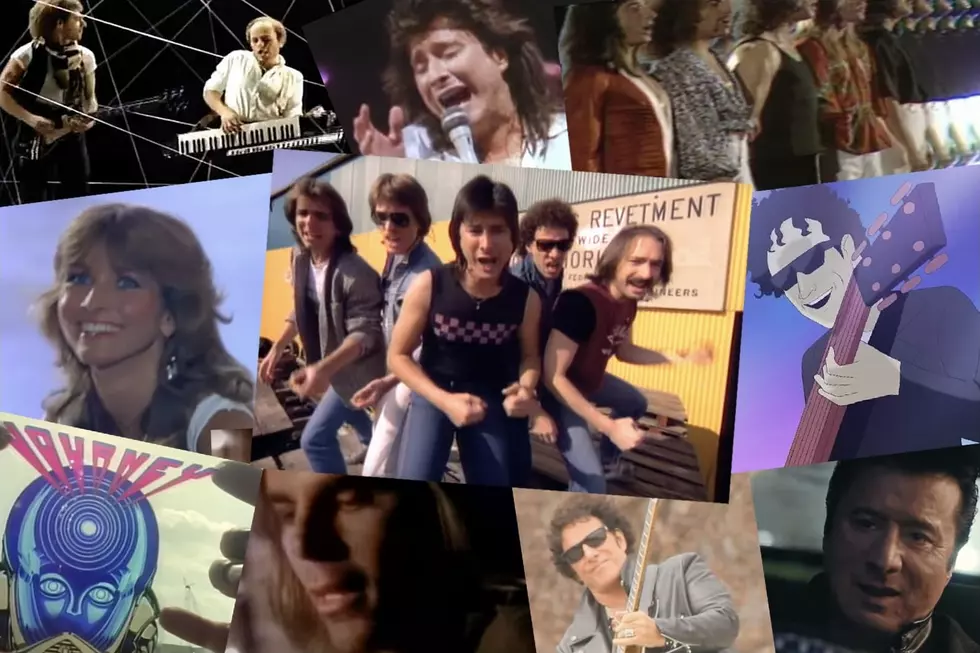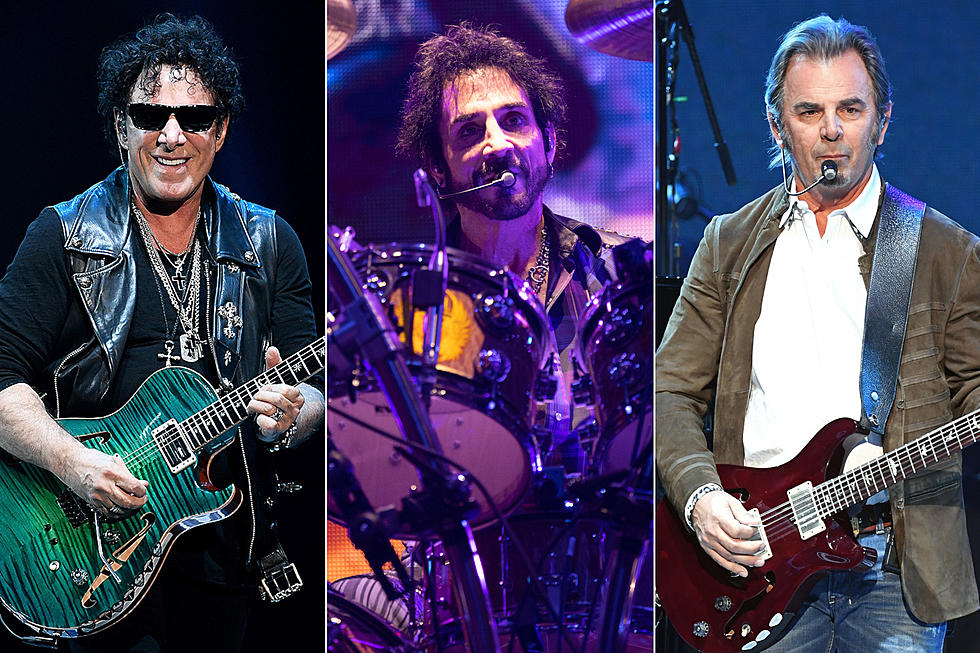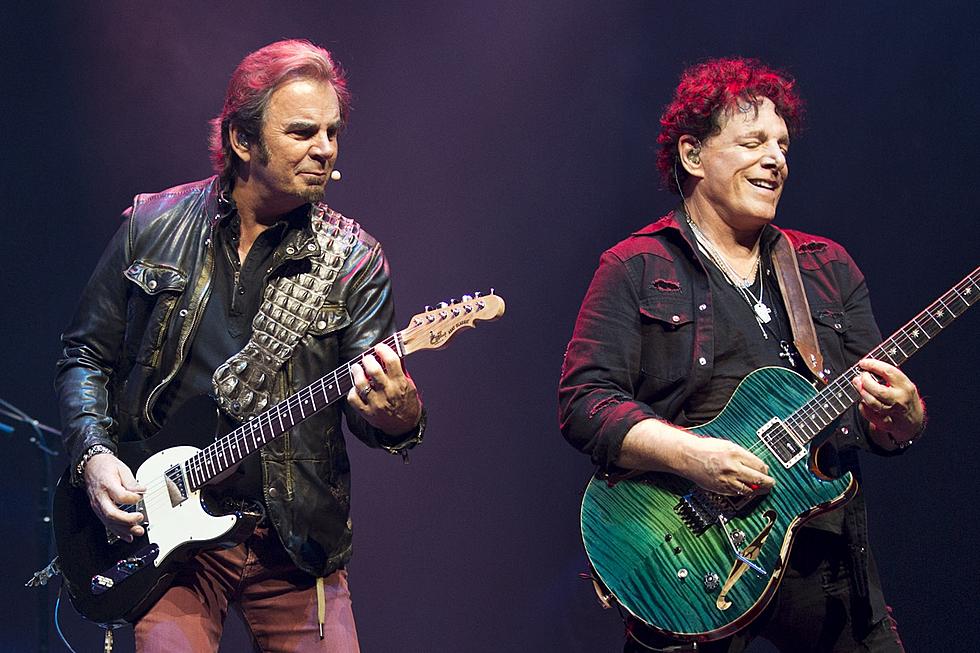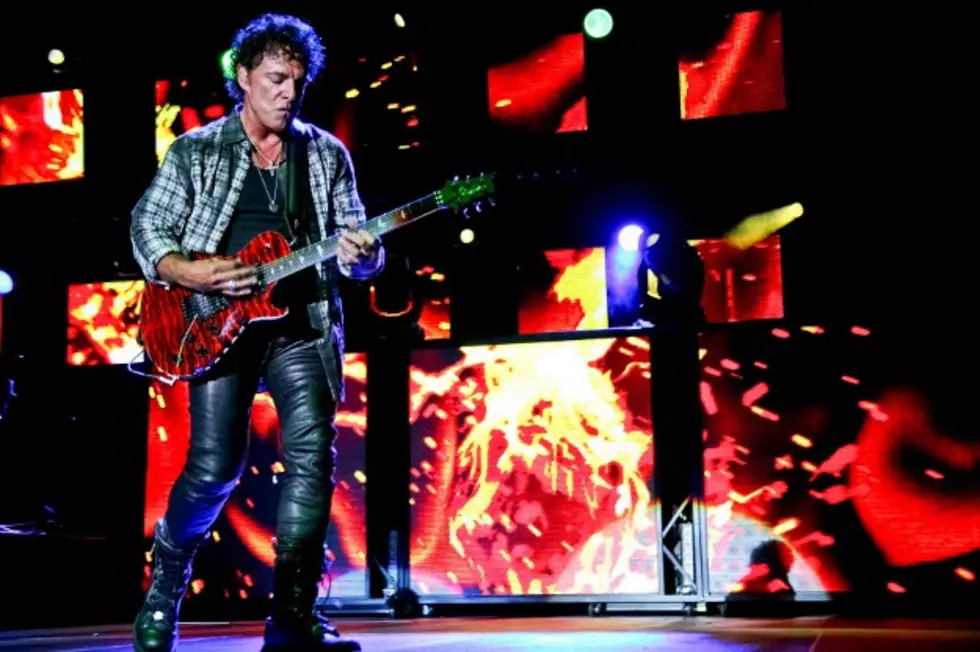
Journey’s Neal Schon Finds ‘The Calling’ With New Solo Album
Journey guitarist Neal Schon is not one to waste time, and the musician is cranking out another solo set titled 'The Calling' during some rare down time.
‘The Calling,’ which will be released on October 22, is the first of two albums from the guitarist. The new disc is described by Schon as “an interesting mix” and an album that has “a lot of different flavors and colors.”
‘The Calling’ reunites Schon with his former Journey bandmate Steve Smith, who drums on a large portion of the album. Jan Hammer also guests on the album, playing keyboard solos on a couple of tracks. Working with what he calls an “open slate” where nothing was prepared in advance prior to recording, Schon emerged with an album that he says “is one of the most rockin’ records I’ve ever made.”
The guitarist took some time out from this summer’s Journey tour to talk with us about both of his new solo albums as well as what’s next on the Journey front.
When we spoke about this new solo album earlier this year, you told me that you’re proud of this record, but “I kind of winged it.” Sound wise though, it sounds like you might have wanted to go to a different place with this album in comparison to some of your previous solo albums that were a little bit lighter in tone.
I like winging it. I like it because you know what? That means that it’s relevant at that moment and whatever’s coming out of you is real and it wasn’t pre-contrived and you’re not thinking about it. So a lot of times I look at it like a lot of blues artists do is when you’re thinkin’, you’re stinkin’. When it comes out of you from nowhere, it’s real.
So we developed a real record, between Steve Smith and myself and Igor Len and then later Jan Hammer came on and did me a favor and played a couple of brilliant solos. But I love the way I did this record and the next one to come out too. There’s another solo record that I finished right after ‘The Calling’ with Deen Castronovo and Marco Mendoza and I did it the same way and it came out sounding really fresh. So I’m loving recording like that, with not a whole lot of rehearsal and songwriting [time]. If you’re working with the right guys, it can work.
When you worked on this material, did you have the mindset going into it that you wanted Steve to play on it, or was that completely spontaneous?
It was all spontaneous. I knew that I wanted to a record that was well rounded musically, that touched on a lot of different areas that I love about the music that I listen to and that I’ve played and correlated with throughout the years. I like the fact that it’s rockin’. It has sections that are rockin’ and very electric and then there’s sections that are really deep and bluesy. But I love the fact that there’s a lot of melody as well, for being an instrumental record, I think there’s a lot of memorable melodies on this record. And that’s what a lot of people are telling me that they love about it. They love that it has fire, emotion and melody.
You could work with a lot of different drummers. What did you want to get out of Steve on these tracks that made him a better fit in comparison to somebody else?
Well, you know what is missed [about Steve] is [that he’s] so musical. I really feel that he’s one of the most musical drummers I’ve ever worked with, because he thinks outside of the box. Of course, he thinks [a lot when it comes to] drums. [So] everything he plays, he’s meant to play. There’s not too much that happens by an accident with that man on drums.
When I mapped out everything with just a [recorded] loop of him, four bars or eight bars of a drumbeat, before I had a song and I laid down a rhythm guitar with the landscape that was in my head, he later came back in and then he wrote it out musically what the arrangement was and then went in and replayed his drum loop to a click and played it as if there was a whole band playing.
[He did that] with the arrangement that I put down with one rhythm guitar. Without it being built up and without sitting in a room with a whole band, I said, “Here’s your crescendo, here’s the solo section, here’s the melody section, here’s the bridge,” and he wrote it all out and went out and played it brilliantly, which enabled me at that point, to go back in and I just started winging it. I started playing solos as we were writing this stuff.
As fast as we were writing it and really not thinking about it at all, [we’d take] just one or two shots through - give me a couple of tracks, let’s go. I laid down solos like that and then really I found that I didn’t re-do much at all. All I did was pick up the bass and I started doing more of a Hendrixy approach to playing bass to a guitar that was already there, moving the bass around to fit what I played in the lead guitar. I loved it - I loved the concept.
Did his work on this material push you at all, as a player? Were there any songs that morphed, based on what he brought to the table?
He’s one of the best, that’s all I can tell you. I think that the guy is more disciplined than any other drummer and studies more than any other drummer I’ve ever met in my life. He just continues to excel and get better and learn more and more about every different type of music that there is out there, drum-wise. It’s just amazing how much information this guy has and the knowledge that he has over his instrument and music in general.
So he’s truly one of the most talented drummers I’ve ever worked with. There’s a lot of great players out there, but Steve, as far as working on a project like this, I will continue to do projects with him, I had such a great time with him. The stuff that we came up with came very effortlessly and from a real place. I love that, that we just have a chemistry, definitely. From the second that we hit the studio together, it was happening.
You’ve been making records for a number of years now. Did this new one give you the chance to employ any unexpected guitar mojo in a new way or perhaps, stumble into some new sounds that came about from just messing around?
You know, I always try to, I have a bunch of amps in the studio and I had a bunch of guitars, different types of guitars. I always manage to, whatever project I’m doing, I’ll lock into, there has to be one straight amp that has no effects that maybe I just put a Wah-Wah in front of [it] with no echoes or any kind of sound effects.
I do like effects on the guitar for coloring, but I always like having a straight dry amp in the center. To where, no matter what I’m playing, if I’m playing it fast, you’re not going to lose it all. You know, if you play just through effects, it becomes a jumble, unless you’re playing very slowly on stuff. So I think I’ve gotten my sound down throughout the years to where I can orchestrate what I’m doing and you can hear things flying around in stereo on both sides, but there’s always a center to what’s going on that’s dry and it’s sitting there.
For this record, I had a new amplifier that Bognar made me, they hand-wired the thing - it’s a Shiva. They sent me a really cool little bottom that had two twelves in it. I miked it up and I put it out there and man, it just spoke. So I left it up. I ended up using Paul Reeds on the whole record, custom guitars he [Paul Reed Smith] made me and a couple of custom Strats - maybe one [Fender] Telecaster here and there for overdubs.
I also was using synths on some of the solos where you can hear something that sounds kind of like a cello following my solos around? Well, I had a Roland Fantom single module, that was built for keyboard players and it had really great string sounds. You’ll hear a cello, violin, a viola once in a while following my solos on the record.
That’s what you’re hearing, is it’s tracking with the amps and everything else separately. There was a kid down at the store that I got the synth from, Bananas in San Rafael [California] and he spent hours transferring all of the information from keyboards to guitar MIDI and it works really, really well. I’ve messed around with synthesizers on guitar for years now, going back to early Journey records and all of the stuff I did with Jan Hammer, there was always some sort of Roland synth - I always worked with Roland. So I locked into a cool sound that I felt was really orchestrated and cool sounding and a bit different.
In a track like ‘Fifty-Six 56,’ that’s got slammin’ keyboard solos and then all of the sudden it goes into this overdrive with Smith and I and really, I forget what patch I used, but I listen to it and it’s a horn that almost sounds like a flugelhorn with a Miles Davis kind of vibe, like a horn player blowing and you hear the guitar too. I really love the fact that you can color your instrument a bit differently like that. I love the true sound of a guitar too and I use that throughout the record, but once in a while, it’s really cool. I’ve always loved horn players, jazz horn players, whether they’re playing sax or trumpet. I always loved Miles Davis, so there’s a bit of that throughout this record.
You were just putting the finishing touches on a second album with Marco Mendoza and Deen when we last spoke. You told me at the time, “ It’s a power trio, really tripped out like late ‘60s/’70s, but modern too in some areas.” Can you tell me some more about some of that material? Which songs are you really proud of?
I just finished mixing it and I worked on this record a long time too, throughout the last two years, going back and forth to Nashville and working with once again, Dave Kamalsky, who I co-mixed this record with. I’d go work for a week there, come home and check it out, I’d go back to him with notes and he’d change things around he goes, “You’ve got to come out here again,” so I’d go back to Nashville and I spent a lot of time working on it, but now I’m glad I did.
Because I spent a lot of money on the record, making sure that I could make it sound as good as I wanted it to sound and I think really you do need to spend the time in the studio, in a good studio, getting good drum sounds, rather than ... I’ve made the records, all of the other records I made that were solo records besides ‘Late Nite’ and the Jan Hammer records, were pretty much in-house, on a computer. They’re good records as well, but there’s nothing like sitting in a nice big room at a studio and a real control room and getting big drum sounds and being able to pretty much morph whatever you want anything to sound like. It was like there was no time that went into writing the material. There was a lot of time that was spent in finishing it. The vocals turned out tremendous.
Marco Mendoza sings his ass off and he sounds like somewhere between, I’d have to say, like a Lenny Kravitz or a Curtis Mayfield and David Lee Roth [Laughs] you know? It’s like all of those in one. And he’s a very soulful cat, so he brings that soul element into the rock, which puts the rock in a completely different place. Whether it’s Mother’s Finest or Kravitz, it’s just got that soul implication to it that I love.
Deen comes from playing with so many people, but for so many years now, with Journey, and he can croon with the best of them on ballads and I’ve got a stretched out ballad that he sang on there that he just killed. And then there’s a couple of rock tunes that he sings on that he just killed. And then I’m going to be singing on stuff that it sounds amazing too and I’m like going, “Wow, this turned out so good.” Jack Blades came in and helped me finish these tracks out vocally with lyrics and melody ideas while we were in the studio cutting it.
Actually, before the [one] song was even written, I called Jack, because I love him because he’s so spontaneous and quick. He can always come up with something that we both go, “Wow, that’s happening.” So I knew that he’d be really good to come in and briefly help us hone in on some areas that I had not gotten to yet, while I was working on writing the songs, because they were not even written. So we kind of just collectively sat in the studio and nailed this stuff, little by little and then honed it in later. But really, the guys, Marco’s so busy - he had to get in and he had to do this very quickly, because he’s always on tour doing something, whether it’s with [Thin] Lizzy or Whitesnake in the past or his own Latin fusion thing that he does, he’s all over the map.
There’s a couple of songs that he and I wrote lyrics to, and I’m sitting here humming melodies through the mic in the studio and then Marco was singing it like right then and it turned out great. I’m really happy with both records.
I’m really excited to hear that album.
Yeah, now that it’s done, I’m really just excited to finish the artwork and get that packaged up and ready to go, because I think ‘The Calling’ is actually going to have some legs. Because I’ve been getting great reviews on it and all throughout Europe there’s a lot of interest and even in the States, I’m getting really good reviews on the record and people are really interested in hearing it. I’ve got Frontiers working really hard on it with EMI distributing it in the United States for them and we’ll see how they do. And then I’ll figure out where I’m going to put this next one out. If they do great, then maybe I’ll go the same format.
It’s been nearly 15 years since you made the 'Trial By Fire' album with Steve Perry. That had to be a frustrating period, because you made a great album and weren’t really able to capitalize on it with touring. I think the “would you ever reunite with Steve” question has been put out there quite a bit and you get it all of the time...
Well yeah, like you said, I get it all of the time and I always answer it the same way and then everybody writes it like it’s the first time I ever said it. You know, it’s like, I’ve been saying it forever that we’ve always left the door open, you know? We didn’t kick Steve out - he walked. And he went on to pursue his solo stuff and went out there playing our material before we did. He was out doing a solo tour and he was playing Journey songs and so at that point, I went “there’s no harm in Jon [Jonathan Cain] and I trying to reform this band,” because we [were very involved too].
Sometimes, I wrote half of the song with Perry [and] a lot of the time after Jonathan came into the band, it was a third, a third, a third between Perry, myself and Jon. So I’m looking at two-thirds of the songwriting which is Jon and I and I go, “We have every right to go out and do this material too.” It turns out that it’s karma, because we wrote the songs and we’re out there and we’re doing really well right now, with Arnel [Pineda].
Me finding him was like a grace from heaven, there’s nothing that this kid can’t sing. He’s a monster vocalist and he’s a tremendous human being and he’s also very quick to say that Steve Perry is one of his favorite vocalists and that if Steve ever wanted to come in and sit in or do a tour, he’s open-minded. Everybody’s open-minded. And you know, we can’t say - I don’t see that there’s any end to this band right now, we’re so strong. Everybody’s getting older, but we still have so much energy and we’re doing great out here. And I think at the point, like I’ve said before, if we were to ever do a farewell tour, I’d want to have not only Steve Perry, but as many guys that were ever involved in Journey. [Gregg] Rolie, Aynsley Dunbar, Robert Fleischman - whomever was in [the band] through the years, you know?
That makes sense. So, what I was going to ask was if creatively, is there any reason in your mind that you’d ever want to make another album with Steve? Is there any uncovered ground there?
I think as Journey, I don’t see that happening. I think that we’ve all moved on and Journey is what it is now. If he were to come into what we’re doing now, it would be a different thing. I wish him well, you know? I hope that someday, that we can get to the point to where I can pick up the telephone and I can talk to him without talking through management and attorneys. I still don’t quite realize why we can’t just talk one on one, for whatever reason, just to say hello - not to pressure anybody to do anything or anything like that - it wouldn’t be like that. [It would be] just in a friendly manner. So we’ll see what happens man. We’re doing just fine where we’re at though.
You’ve got two albums down with Arnel at the helm. Where’s your mind at as far as where you want to go with future recordings or albums, based on the last musical statement you made with 'Eclipse?'
Well, you know what, I’ve got some ideas and we’re kicking it around right now, but we’re planning on touring like non-stop, like we’re talking like the next four years. So hopefully we’ll take some breaks in between and I really don’t know what at this point ... like you said, we’ve done two complete records that I really pushed for with Arnel, to do [as] complete records.
But I don’t know how much good it’s done for us, because we end up having to play our greatest hits every night and one new song here and there. So my new thing, [now that] I’ve sort of digested it all and I’ve reconsidered and reevaluated everything. I love doing albums, because I think the long playing albums are what I prefer. But I think we might get more mileage just doing one or two songs and possibly landing them in movies. [It could benefit us more,] getting them out in different forms rather than a CD - [because] nobody buys CDs anymore, you know? It’s all digital downloads and I think that to get somebody to buy a full record anymore is a feat.
I think maybe one great song will get everybody’s attention more than that and maybe hopefully open up the door again for us to do a full-length record.
More From Ultimate Classic Rock
